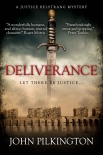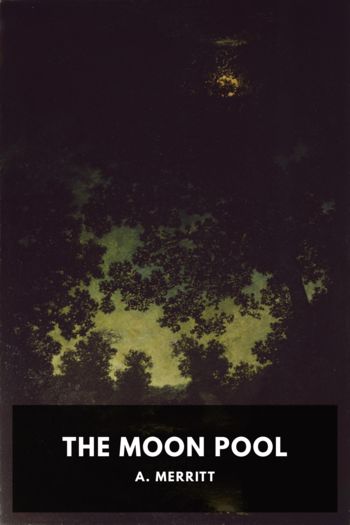The Witching Pool: A Justice Belstrang Mystery (Justice Belstrang Mysteries Book 2) by John Pilkington (love letters to the dead .TXT) 📗

- Author: John Pilkington
Book online «The Witching Pool: A Justice Belstrang Mystery (Justice Belstrang Mysteries Book 2) by John Pilkington (love letters to the dead .TXT) 📗». Author John Pilkington
***
The day was fair, however, and the ride pleasant enough in morning sunshine: across the river at Worcester, then southward towards the village of Kempsey. I rode Leucippus, Hester her chestnut mare Althea, the two of us in sable attire, our hats bound with black silk. A little north of Kempsey we turned aside on the lane to Ebbfield, Giles Cobbett’s manor. There were no other travellers, which caused me to wonder if we were somewhat late for the ceremony. And on reaching the house, which was shaped like an H, its imposing entrance flanked by two-storied wings, we found the place all but deserted. We crossed the moat by its narrow bridge, entered the courtyard through its covered arch and drew rein. I recalled that the chapel, built a century ago by Cobbett’s forefathers, stood at the rear of the house. I was about to dismount when a servant appeared from somewhere, stumbled towards us and made his bow.
‘Your pardon, sir…’ the fellow was aged, white-haired and stooped. ‘If you seek my master, I fear I must dissuade you. The house is in mourning, and I’m loth to trouble him.’
‘We come to attend the funeral,’ I said.
At that, the man looked surprised. ‘Is it so? I… in truth, sir, we did not expect mourners from outside the family. Might I know your name, that I can convey it?’
I told him, naming Hester as waiting-woman to my late wife.
‘Justice Belstrang… of course.’ He peered at us both. ‘I must tell you that the service is almost over – it was my master’s wish it be done early. Yet you may attend the burial, if it please you. I cannot think there would be objection…’
His eyes fell, his agitation plain to see. Perhaps he thought we were ignorant of the circumstances of Susanna Cobbett’s death, and feared it would fall to him to inform us. To put him at ease, I lifted a hand.
‘Pray, do not fret,’ I said. ‘We are aware of the tragedy that has befallen your master and his family. We’re but here to offer condolences. And we’ll wait at the graveside, if that’s fitting.’
The old man’s relief was evident. ‘By all means, sir… Master Justice. If you’ll dismount, I’ll have your horses cared for and convey you to the place.’
It was done, a stable lad arriving to lead our mounts away. Thereafter Hester and I followed our guide through the doors of the house, where all was still and silent, with not even a servant to be seen. Soon we had passed through the hall to a rear door which led to the gardens. Some distance away stood the small chapel surmounted by its cross, with the Cobbett family’s arms. Looking towards it, I bent my ear for any sound, but heard nothing.
‘Are many mourners come?’ I enquired of the servant.
‘In truth sir, you are the only ones not of the household,’ was his reply. ‘Apart from Master Humphreys and his wife, who are tenants. The family wished for privacy, in view of…’
He broke off. Likely he had known Susanna Cobbett all her life; it was a tragedy for everyone. Seeing him fighting tears, I laid a hand on his arm.
‘I pray you, leave us and go your ways,’ I said. ‘We’ll find the grave.’ But as the old man bowed and turned to leave, I stayed him. ‘One moment: the service. Who is conducting it?’
‘That’s Parson Woolland, sir,’ the other answered. ‘Thomas Woolland, from Kempsey.’
The name was unfamiliar to me. I watched the old man walk away, head down, whereupon Hester and I took the path to the chapel. We would not enter, but walked past it. I was curious: something felt amiss here, though I could not have named it. Soon we stood in a grassy area, with a fence and a view of fields beyond. There were no headstones; members of the family were interred in their vault at the church in Kempsey. But a short way off was a freshly dug grave, with a mound of earth beside it. Nearby stood the solitary figure of a labourer, spade in hand, regarding us without expression.
Just then, Hester took my hand. ‘They’re coming out,’ she murmured.
I turned to see the chapel doors open, and drew breath: the burial of Susanna Cobbett was about to take place.
FIVE
The first person to emerge from the chapel was a gaunt, bony woman swathed in black. She was followed by two slight figures: Giles Cobbett’s surviving daughters, heads bowed in grief. The woman, I surmised, was their nurse. After waiting for them to draw level, she proceeded to shepherd them forward. Then the parson in his surplice appeared, walking with stately gait, followed by the coffin borne on the shoulders of four servants clad in black druggett. The unmistakeable figure of Cobbett himself followed: handsome and imposing, gazing straight ahead. Close on his heels came a stout, middle-aged man whom I guessed was his tenant, Humphreys, guiding a woman who walked somewhat hesitantly. They were followed by a handful of Ebbfield servants, men and women, dressed in everyday garb.
There had been no time, I realised, with Susanna’s funeral following so hard upon her death, to fit them out in mourning attire. And in truth it was a sorry, almost ragged procession that filed towards the grave. Hester and I had drawn aside, but as the only bystanders we were conspicuous enough. There were glances in our direction. Jane, the elder daughter, a pretty girl of perhaps fourteen years, looked sharply at me. While the younger one, whose name I recalled was





Comments (0)